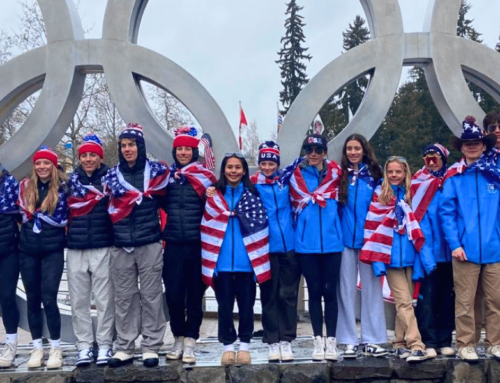For The Love of The Sport
In May of 2019, the United States Ski Team hosted its women’s development camp at Mammoth Mountain in California. U16 girls would be joining the D Team women for ten days of spring training prior to the summer block. But the combination of age groups and skill levels was just one unique aspect of the camp. Unlike other training camps these girls have attended before, their coaching staff would be entirely female.
Marjan Cernigoj, the U.S. Women’s Head Development Coach, had approached Alpine Development Director, Chip Knight, with a proposal – why not enlist the best female coaches from across the country to help lead these young girls working to reach the highest level of skiing in their country?
“I had never worked with an all-female staff,” says Katie Twible, the newest hire within the U.S. Women’s coaching staff. “I will not lie, at first I was a little bit hesitant because I do believe males are a huge asset to what we do. We’ve all learned from male coaches because that’s the name of the game, right? It’s a very male-dominated sport. So, to be able to be with a group of women and learn from each other, to be able to show athletes that a full female staff is capable and strong and able to handle themselves, was something special.”

Twible spent the past few years as the Women’s Head Coach at the Ontario Ski Team in Canada before joining U.S. Ski & Snowboard as the Women’s C Team Coach, where she will be focusing on developing women that are bridging the gap between Europa Cup and the World Cup level on the tech side. Prior to her time with OST, Twible led the U16 team at the Craigleith Ski Club after closing out her career as an athlete at the University of Colorado. Looking back on her journey as a racer, Twible can’t remember a time when she had a female coach. But the absence of women in leadership throughout her years of racing is not her motivation to become a coach, it is the sheer love of the sport, and the ability to be a positive influence in her athlete’s lives.
“I just consider myself a coach. It’s not whether I’m a female, or who I’m coaching, whether I’m coaching males or I’m coaching females. I approach my job the same for anybody that’s in this role, trying to create awesome athletes,” says Twible.
Her colleague, Mary Joyce, who joined the camp as a Rowmark Academy coach helping assist one of her athletes that had been invited to participate, feels the same way.
“The ultimate goal for everyone is just to be the best coach you can be, gender aside,” says Joyce. “And I think a lot of women aren’t doing it because they think ‘oh, we need to have more women [in coaching]’, I think they are doing it because they love this and this is what they want to do. “
Joyce recently joined the University of Utah Alpine staff as Assistant Coach alongside former U.S. Ski Team Men’s Development Coach, JJ Johnson. At 25-years-old, Joyce was the youngest coach at the camp and felt extremely humbled to be in the presence of other female coaches that have paved the way for her be in the position she is in today. Not only was the female-driven environment important to her and to her growth as a coach, but she says it was also extremely important to the athletes.

“I do think that it is huge to see women in those roles, and I do think it makes a big difference. There was no one that had a crazy ego that was trying to prove something. We were all in it together and we all worked so well together. That doesn’t always happen at a lot of camps,” says Joyce. “Here are a group of five or six women coaching on the hill together at the same time, providing an awesome training environment, communicating super well, having fun together, relying on each other, and I think for [the athletes] to see that is huge. It should instill confidence in what they can do.”
Feedback from parents and athletes that attended the camp in Mammoth proves that as a developing young woman, being coached by women that have walked the path before you has a significant impact on perspective and confidence. Girls and women in sport operate on a different playing field than boys and men – meaning that expectations tend to be different. There is a certain stigma to competitiveness among a group of girls, and that can either be translated into strength as a group, or jealousy and animosity toward a teammate that could be performing better on any given day. Girls being lead by women has the potential to break down age-old stigmas that girls coming up through sport may feel, and Twible definitely noticed a difference in behavior in the girls from the beginning of the camp to the end of the camp.
“I feel like sometimes as women we feel like we need to be nice. That’s something we talked a lot about at the camp,” says Twible. “Be nice, but that doesn’t mean that you have to downplay what you’re doing. You can still go out and want to kick butt and want to beat each other, but what that’s going to do is raise the bar and make you strong together and make you fast together. Be that awesome, nice, supportive athlete, but be competitive. That’s what we are here for. ”
Part of how both Twible and Joyce combat the insecurities and nervousness in their athletes is by focusing on them as individuals and as people first, building bonds that create trust and instill confidence in themselves, their teammates, and their capacity to succeed. By being leaders and role models themselves, it shows the girls they have the power to do the same.
“Be a human first, and then build from that.”
– Katie Twible
“Be a human first, and then build from that,” says Twible. “All of these girls that I get to coach this year – we have 7 in our group – they’re all individuals. They’re all different. So getting to know them, and then helping them to be successful and accomplish the goals that they set out for themselves by individually understanding each one of them is what I want to bring to the table. Let’s push each other and make each other better and stronger and build each other up. Because that’s what’s going to make these girls fast this year.”
“There’s always that want for growth. Being able to help people to get to that spot and help them be well rounded on and off the hill is a huge draw for me,” adds Joyce. “At the end of the day, I want them to just be the best person they can be and know their potential and want to reach it.”
The coaching style both Twible and Joyce bring to the table within younger age groups is reflected at the top of the sport by none other than the U.S. Women Speed Team’s Karin Harjo. Harjo has been bringing her passion for the mountain, skiing, and building human connections to the sport since she made the decision to leave her job to be a full-time ski instructor. She had been a lab tech for a molecular toxicology lab at the University of Washington, hoping to find a cure for liver cancer, when she chose to ditch her job and degree in cell and molecular biology to follow her gut.
“From there I guess you could say I got a Master’s in skiing,” jokes Harjo.
Her drive to grow and learn in the world of skiing has brought her from teaching and coaching four-year-olds, preteens, and teenagers, to reaching the top of the sport as a coaching for the women’s world cup speed team. Her hard work and perseverance eventually led her to making history in 2016 when she became the first woman to set a World Cup slalom course.
“Being a coach, in my mind, is a huge, huge responsibility, because the impact that you have on peoples lives from the time they are young to however long you have with them is massive,” says Harjo. “It’s an incredible responsibility that shouldn’t be taken for granted and we might not be trying to solve a cure for cancer but in my mind, it’s just as important because of that impact that we have.”
For the past ten years, Harjo has followed the same four guiding principles. Stay humble, be helpful, bring joy to the job, and have gratitude. These values have kept her moving forward as a coach and as a person, and continue to impact her career and her athletes in a positive way. The strengths she claims to bring to the table are empathy, curiosity, and urgency. Her capacity to tune into the athlete as an individual, check her ego at the door, and show up ready to help them be the best that they can be every day is what makes Harjo a good coach, and is why many up and coming female coaches see her as the woman that paved the way, and showed them that reaching the top is possible.

“Do I see myself as a role model? Absolutely. My goal is always to do whatever I can to help, whether it’s young women or girls, in any way I can. Help them learn and grow and if anything, try and help pave the way for them because I think that’s part of what our calling is, as any coach in any profession,” says Harjo.
Her message remains the same as Twible and Joyce. No matter what level of coaching a woman works at, it is not her gender that got her where she is today. It is her dream, her drive, what she knows, and her ability to lead people that took her to the top of the sport.
“My presence should prove that if you’re qualified and passionate about what you do, you can coach at any level regardless of gender,” says Harjo. “If all it does is prove that women can work in a male-dominated field, then I do myself a disservice. That’s not the message that it should drive. If you can see it, you can be it. That’s what it’s about. It’s about going after whatever it is that you want to go after and doing the best job you can.”
These women recognize that in their field, they are the minority. And they understand that they play a role in lifting the next generation of athletes and coaches up to be better than they were yesterday. But their presence may have more impact than they realize, just as Harjo did when an 8-year-old girl, whose mother is a coach herself, asked her for her autograph as she stood in the finish corral of a World Cup one afternoon a few years back. But to them, making a ‘statement’ isn’t what it’s all about.
“I realize that being one of the few females on the [World Cup], I stick out. But my goal at the end of the day is that’s not the first thing people think of,” explains Harjo. “My goal is that people think ‘wow they’ve got great coaches’ and they don’t stop to label. It doesn’t matter, gender, race, orientation, any of it. At the end of the day, if you’re a good coach, that’s what matters. Never stop being good.”





















